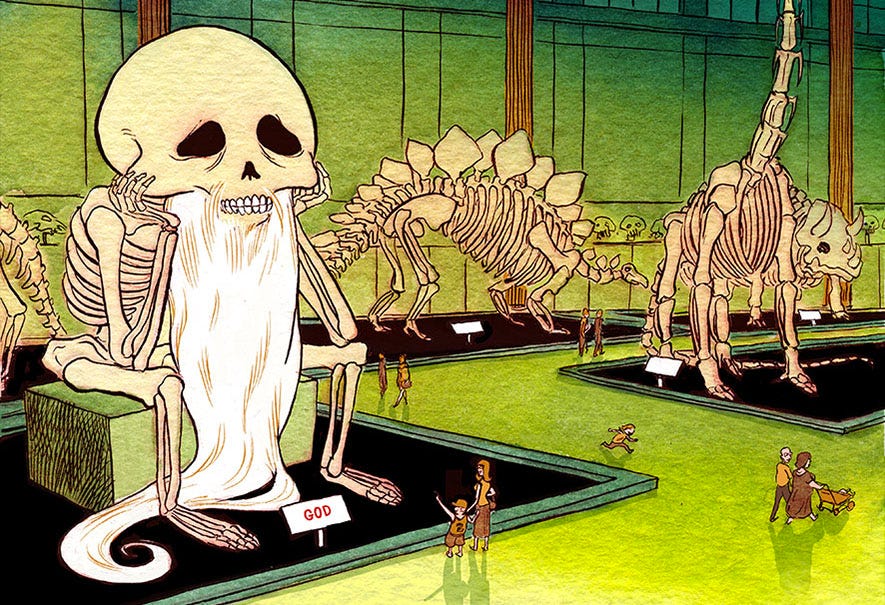why peter thiel embraced roko's basilisk
Silicon Valley embraced a new religion. And it borrows quite heavily from an old one.
Of all the things I say about our AI-obsessed tech oligarchs, the one that most likely sounds like poetic license or a comic exaggerations is that artificial intelligence isn’t just a technology for them, but a downright cult-like devotion to the idea that if they fund AI research enough, they will one day become digital gods. Hence the rightfully maligned, but also grossly misunderstood Techno-Optimist Manifesto from VC Marc Andreessen, and the bizarre “woke AI” fears of Elon Musk.
Now, I can offer a new example. Peter Thiel, the misanthrope who, in a very strange podcast appearance, hesitated to answer if humanity should survive, made a speech to an organization of highly religious tech workers proclaiming that any slowdown in developing new AI or regulating the industry, would hasten the arrival of the Biblical Antichrist and a totalitarian one world order.
We can, of course, debate whether the Book of Revelation is meant as a prediction of the future or a parable about the injustices of living under the heel of the Romans and having to pay tribute to their pagan gods. Many theologians have. But if it is true, the billionaire class demanding and working on the tools for an AI surveillance state, such as Thiel and Larry Ellison of Oracle, should really look in the mirror before expanding on these thoughts. And since they won’t, let’s do it for them.
fear and loathing in silicon valley
If all this fear-mongering seems very odd to you, you’re right. Despite enormous gains in our technology and scientific achievements over the past 60 years, Thiel thinks that we are in a period of stagnation that began sometime in the 1970s. Meanwhile, as he frets about the Antichrist ushering in an era of global totalitarianism, he founded and owns a company focused on giving aspiring totalitarians tools to spy on their critics in real time, which seems a little hypocritical to put it mildly.
Since we can’t pretend that we haven’t explored the solar system with robotic probes, mass produced electronics straight out of science fiction, made space travel routine, achieved cloning, started editing genomes, created synthetic life with AI, and are now actively learning the universe’s fundamental secrets, we really have to ask what in the hell Thiel is talking about. What doomsday is he seeing, and why is he actively trying to work both sides of the crisis in question?
The only thing that comes to mind is the one Singularitarian thing-that-shall-not-be-named, the thought experiment of Roko’s Basilisk. Essentially, it’s the Pascal’s Wager of Singularitarianism. What if a super-intelligent AI is created, and it decided that any individual who didn’t do everything in their power to speed along its progress should be punished for depriving humanity of its benevolent rule by another few minutes, or hours, or years in which it could have guided us as it saw fit?
looking for a god in the machine
And it’s this train of thought that brings us back to Thiel’s bizarre speech. It was not meant to be public until someone screwed up and posted the minutes, and intended for people who were looking for religious meaning in their technical work and lives as the supposed creators of the future. I would object to the idea that Thiel is a devout Evangelical given his affinity towards AI-powered transhumanism, but I’m very open to the notion that he and a lot of people like him are looking for a higher power.
Many probably have religious backgrounds and still hold on to these beliefs, or feel that the dehumanizing orgy of self-dealing and self-aggrandizement that swallowed Silicon Valley whole left them in search of something a little more inspiring than a VC party after a successful funding round, exit, or IPO. Others may be lapsed believers, maybe even from strict religious upbringings, kind of like Eliezer Yudkowsky and his childhood steeped in Orthodox Judaism.
Given the rate of progress in science and technology, and the subsequent rejections of traditions, norms, and blind faith over the past century, they may be shaken in their faith in an omnipotent, omniscient, supernatural deity. But a super-intelligent AI with all the answers, that knows what’s best for us, predicts our future, and may even save us from mortality itself one day soon? A god we can build, possibly inspired by some supernatural, unknowable force? Now that’s something they could get behind…



